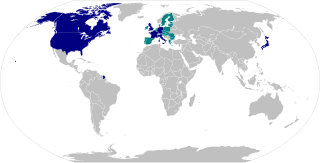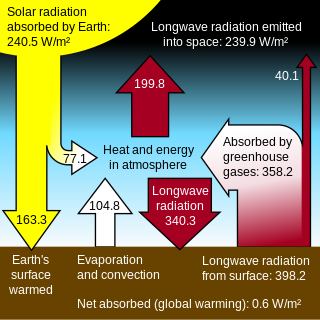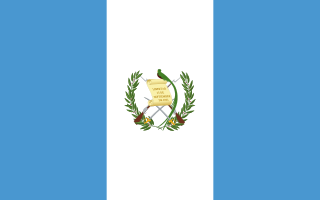Globalization or globalisation is the process of interaction and integration among people, companies, and governments worldwide. As a complex and multifaceted phenomenon, globalization is considered by some as a form of capitalist expansion which entails the integration of local and national economies into a global, unregulated market economy. Globalization has grown due to advances in transportation and communication technology. With the increased global interactions comes the growth of international trade, ideas, and culture. Globalization is primarily an economic process of interaction and integration that's associated with social and cultural aspects. However, conflicts and diplomacy are also large parts of the history of globalization, and modern globalization.

Climate change occurs when changes in Earth's climate system result in new weather patterns that last for at least a few decades, and maybe for millions of years. The climate system is comprised of five interacting parts, the atmosphere (air), hydrosphere (water), cryosphere, biosphere, and lithosphere. The climate system receives nearly all of its energy from the sun, with a relatively tiny amount from earth's interior. The climate system also gives off energy to outer space. The balance of incoming and outgoing energy, and the passage of the energy through the climate system, determines Earth's energy budget. When the incoming energy is greater than the outgoing energy, earth's energy budget is positive and the climate system is warming. If more energy goes out, the energy budget is negative and earth experiences cooling.

The G8, reformatted as G7 from 2014 due to the suspension of Russia's participation, was an inter-governmental political forum from 1997 until 2014.

The World Economic Forum (WEF), based in Cologny-Geneva, Switzerland, was founded in 1971 as a not-for-profit organization. It gained formal status in January 2015 under the Swiss Host-State Act, confirming the role of the Forum as an International Institution for Public-Private Cooperation. The Forum's mission is cited as "committed to improving the state of the world by engaging business, political, academic, and other leaders of society to shape global, regional, and industry agendas".
Vodafone Group plc is a British multinational telecommunications conglomerate, with headquarters in London and Newbury, Berkshire. It predominantly operates services in the regions of Asia, Africa, Europe, and Oceania. Among mobile operator groups globally, Vodafone ranked 4th in the number of mobile customers as of 2018.

The Gulfstream G550 is a business jet aircraft produced by General Dynamics' Gulfstream Aerospace unit in Savannah, Georgia, US. The certification designation is GV-SP. There were 450 Gulfstream G550s in active service as of January 2016. A version with reduced fuel capacity was marketed as the G500.
A global city, also called world city or sometimes alpha city or world center, is a city which is a primary node in the global economic network. The concept comes from geography and urban studies, and the idea that globalization is created, facilitated, and enacted in strategic geographic locales according to a hierarchy of importance to the operation of the global system of finance and trade.

A service star is a miniature bronze or silver five-pointed star 3⁄16 inch in diameter that is authorized to be worn by members of the seven uniformed services of the United States on medals and ribbons to denote an additional award or service period. The service star may also be referred to as a campaign star or battle star depending on which award is authorized the star and the manner in which the device is used for the award.

The Group of Seven (G7) is a group consisting of Canada, France, Germany, Italy, Japan, the United Kingdom, and the United States. These countries, with the seven largest IMF-described advanced economies in the world, represent 58% of the global net wealth ($317 trillion). The G7 countries also represent more than 46% of the global gross domestic product (GDP) based on nominal values, and more than 32% of the global GDP based on purchasing power parity. The European Union is also represented at the G7 summit.

The NatureServe conservation status system, maintained and presented by NatureServe in cooperation with the Natural Heritage Network, was developed in the United States in the 1980s by The Nature Conservancy (TNC) as a means for ranking or categorizing the relative imperilment of species of plants, animals, or other organisms, as well as natural ecological communities, on the global, national and/or subnational levels. These designations are also referred to as NatureServe ranks, NatureServe statuses, or Natural Heritage ranks. While the Nature Conservancy is no longer substantially involved in the maintenance of these ranks, the name TNC ranks is still sometimes encountered for them.

The G20 is an international forum for the governments and central bank governors from 19 countries and the European Union. Founded in 1999 with the aim to discuss policy pertaining to the promotion of international financial stability, the G20 has expanded its agenda since 2008 and heads of government or heads of state, as well as finance ministers and foreign ministers, have periodically conferred at summits ever since. It seeks to address issues that go beyond the responsibilities of any one organization.
Global citizenship is the idea that all people have rights and civic responsibilities that come with being a member of the world, with whole-world philosophy and sensibilities, rather than as a citizen of a particular nation or place. The idea is that one’s identity transcends geography or political borders and that responsibilities or rights are derived from membership in a broader class: "humanity". This does not mean that such a person denounces or waives their nationality or other, more local identities, but such identities are given "second place" to their membership in a global community. Extended, the idea leads to questions about the state of global society in the age of globalization. In general usage, the term may have much the same meaning as "world citizen" or cosmopolitan, but it also has additional, specialized meanings in differing contexts. Various organizations, such as the World Service Authority, have advocated global citizenship

Global warming is a long-term rise in the average temperature of the Earth's climate system, an aspect of climate change shown by temperature measurements and by multiple effects of the warming. The term commonly refers to the mainly human-caused observed warming since pre-industrial times and its projected continuation, though there were also much earlier periods of global warming. In the modern context the terms global warming and climate change are commonly used interchangeably, but climate change includes both global warming and its effects, such as changes to precipitation and impacts that differ by region. Many of the observed warming changes since the 1950s are unprecedented in the instrumental temperature record, and in historical and paleoclimate proxy records of climate change over thousands to millions of years.
The G8 Climate Change Roundtable was formed in January 2005 at the World Economic Forum in Davos, Switzerland. Its purpose was to address the global climate change issue facing governments, business and civil society. The first meeting was held in Gleneagles, Scotland, from 6–8 July 2005, to coincide with the 31st G8 summit.

A greenhouse gas is a gas that absorbs and emits radiant energy within the thermal infrared range. Greenhouse gases cause the greenhouse effect. The primary greenhouse gases in Earth's atmosphere are water vapor, carbon dioxide, methane, nitrous oxide and ozone. Without greenhouse gases, the average temperature of Earth's surface would be about −18 °C (0 °F), rather than the present average of 15 °C (59 °F). The atmospheres of Venus, Mars and Titan also contain greenhouse gases.

5G is the latest generation of cellular mobile communications. It succeeds the 4G, 3G and 2G (GSM) systems. 5G performance targets high data rate, reduced latency, energy saving, cost reduction, higher system capacity, and massive device connectivity. The first phase of 5G specifications in Release-15 will be completed by April 2019 to accommodate the early commercial deployment. The second phase in Release-16 is due to be completed by April 2020 for submission to the International Telecommunication Union (ITU) as a candidate of IMT-2020 technology.
The legal and cultural expectations for date and time representation vary between countries, and it is important to be aware of the forms of all-numeric calendar dates used in a particular country to know what date is intended.
Dasyvesica lophotalis is a species of snout moth in the genus Dasyvesica. It is found in Jamaica and Costa Rica.











